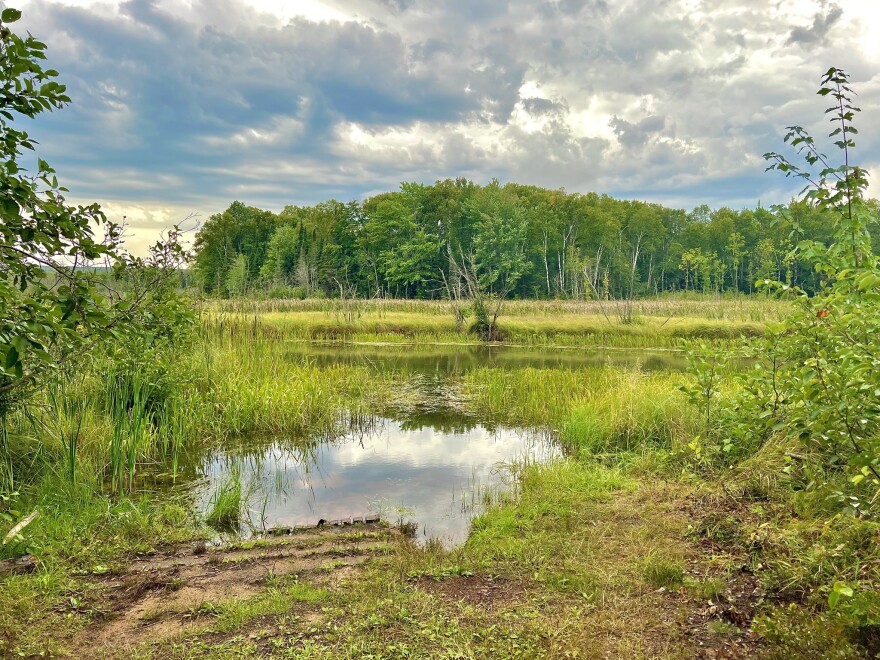Four months ago, the U.S. Supreme Court decided on a case that impacts waters in Wisconsin and across the country. Sackett v EPA resulted in diminished federal protections for wetlands – the natural “sponges” that soak up stormwater and contaminants and provide rich wildlife habitat.
A free virtual symposium zeroing in on impacts on the Great Lakes is coming up next week, Oct. 3, at noon. Among the panelists is Melissa Scanlan, a water policy expert and director of the Center for Water Policy within UW-Milwaukee’s School of Freshwater Sciences.
“The Sackett decision requires a continuous surface connection with a traditional stream, river, lake or pond in order for federal jurisdiction to exist, you need to have this continuous connection,” Scanlan says.
Before European settlers showed up on the landscape, Wisconsin was rich in wetlands. Fast forward to today, almost half of those spongy pockets that play a role in aquatic and aerial life have been swallowed up by agriculture and development.
The May Supreme Court decision opens the door to more wetland loss. According to early estimates from the Environmental Protection Agency, the EPA, “They estimate 63% of acres of wetland across the entire country have lost federal jurisdiction. Each state is going to present a different scenario,” Scanlan says.

A few years ago, pre Sackett ruling, two nonprofit conservation groups — The Nature Conservancy and Wisconsin's Green Fire — were already sounding an alarm about potential wetland loss in Wisconsin to show what the potential impact of a Trump era rule on this issue.
"We know that the post Sackett rule is going to go even further than this 2020 rule. So, the maps that they did are actually a conservative estimate. In northern Wisconsin, they were mapping 72% of the wetlands, losing federal jurisdiction. And then around Milwaukee it was 51%," says Scanlan.
Scanlan says wetlands have long been a thorn in the side of development.
Congress crafted The Clean Water Act more than 50 years ago to protect and avoid conflicts around Waters of the United States including wetlands.
"With a statute like that, maybe that would answer the question, but no, it's really only opened up many questions and controversies over the decades. And there's been a lot of line drawing, especially related to wetlands because there are powerful lobbying interests that want to fill wetlands without regulation," she says.

So why does the projection of wetland loss matter?
Let’s look at flooding. More erratic and extreme events are anticipated due to climate change. Storms have already caused billions of dollars of damage.
Wetlands have a natural capacity to reduce flooding by as much as 60%. Scanlan says wetlands’ role in keeping prized fish populations healthy is priceless.
"So many millions of dollars related to sports fishing are dependent on isolated wetlands and ephemeral waters that are cleaning the water and cooling the water before it enters these spawning areas for the fish," says Scanlan.
And wetlands play a key role keeping ever-more stressed ecosystems in balance.
Scanlan says not too long ago, Wisconsin was seen as a trailblazer when the state passed wetland protection unanimously.
"The Wisconsin Legislature in 2001 got together and passed a comprehensive wetlands program that really set Wisconsin as a leader,” Scanlan says.
The Legislature later scaled back its protections.
Scanlan says it’s up to state policymakers to look closely at where wetlands stands in the wake of the U.S. Supreme Court decision. Wisconsin’s 2001 state law added a layer of wetland protection. The legislature could restore that protection.
“Once we start focusing on water as a system and applying our regulations in a way that really protects that whole system, I think we’ll be much better off,” she says.







